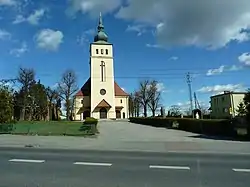Białośliwie
Białośliwie [bjawɔˈɕlivjɛ] (German: Weißenhöhe) is a village in Piła County, Greater Poland Voivodeship, in west-central Poland. It is the seat of the gmina (administrative district) called Gmina Białośliwie.[1] It lies approximately 28 kilometres (17 mi) east of Piła and 80 km (50 mi) north of the regional capital Poznań.
Białośliwie | |
|---|---|
Village | |
 Sacred Heart church in Białośliwie | |
 Białośliwie | |
| Coordinates: 53°6′N 17°8′E | |
| Country | |
| Voivodeship | Greater Poland |
| County | Piła |
| Gmina | Białośliwie |
| First mentioned | 1216 |
| Population | |
| • Total | 2,600 |
| Time zone | UTC+1 (CET) |
| • Summer (DST) | UTC+2 (CEST) |
The village has a population of 2,600.
The oldest known mention of Białośliwie comes from 1216, when it was part of Piast-ruled Poland.
During the German occupation of Poland (World War II), in 1939, dozens of local Polish inhabitants were murdered by the Germans in mass executions carried out in Świerkówiec, Paterek and in the woods on the Noteć river.[2]
The village has a pre-war Catholic church and two historic railway stations: regular and narrow-gauge.
References
- "Central Statistical Office (GUS) - TERYT (National Register of Territorial Land Apportionment Journal)" (in Polish). 1 June 2008.
- Maria Wardzyńska, Był rok 1939. Operacja niemieckiej policji bezpieczeństwa w Polsce. Intelligenzaktion, IPN, Warszawa, 2009, p. 92, 163–164 (in Polish)
